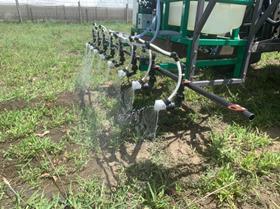
A consortium of leading horticultural companies and researchers is investigating solutions to ‘soil splash’ contamination of fine beans grown by commercial and smallholder farmers in Kenya for export to the UK.
The group, which received frunding from Innovate UK in 2019, is undertaking on-farm research in Kenya to evaluate the efficacy of spray applications usinganionic polyacrylamides (PAMs) to minimise soiling of fine beans, which accounts for more than 25 per cent of farm gate rejections due to 'soil splash' contamination.
These rejections are due to direct yield losses associated with the splash transfer of soil as well as plant pathogens, alongside bean quality defects due to fungal and bacterial pathogens such as Halo Blight and Bean Anthracnose.
Polymers such as PAMs have been shown to be effective at stabilising soil aggregates and prevent soil splash, capping and erosion is well documented.
According to the consortium, PAMs do not degrade into acrylamide monomers or other toxic compounds under environmental conditions and do not pose a food safety risk. However, a technological innovation was required to effectively spray PAM to the soil surface and mitigate soil splash.
SNF, a major player in manufacturing water-soluble polymers,has developed and patented an innovative Twin-Fluid nozzle that allows the dual application of polymer and water to the soil surface.
Impact
The research has the potential to make a significant impact since Kenya's agriculture sector contributes 30 per cent to the country’s GDP and accounts for 80 per cent of national employment.
Shipments of fine beans to the UK and the EU account for 70 per cent of the country’s total vegetable exports and 21 per cent of its horticultural exports.
About 60 per cent of fine bean exports are produced by more than 50,000 Kenyan smallholder farmers acting as growers for commercial farms. It is therefore a crop with great potential to address food insecurity, income generation and poverty alleviation.
Kenya’s total production of fine beans is approximately 62,400 tonnes a year, however with only 60 per cent 'pack-out' (due to rejections), realised exports are only 37,400 tonnes.
Phase 1 trials
Results from their Phase 1 trials conducted in 2021 indicate that the PAM application technologies they have developed can reduce soiling by up 67 per cent.
Applying PAM products to the soil surface can thus effectively increase marketable yields, limit the number of rejections, reduce water consumption and increase farm revenue for bean farmers, the consortium said, adding that this was achieved without any negative impact on yield.
Phase 2 trials
As part of the current Phase 2 field trial in 2021/2022, the team will assess the effect of the timing of spray application and the effect of repeated applications on reducing soiling as well as other quality defects.
A qualitative assessment of the impact of reducing soil splash on Halo Blight incidence and severity will also be undertaken as well as impacts on post-harvest shelf life.
The team, supported by SNF, will further explore appropriate means of establishing a distribution network to deliver PAM to farmers, coupled with outreach and education capabilities to train farmers in its correct application.
In the UK, the US and Australia, anionic PAMs are used as soil conditioners, and the researchers will meet with regulatory agencies in Kenya, such as KEPHIS (Kenya Plant Health Inspectorate Service), to determine the steps required to get PAM licensed for commercial use as a soil conditioner.
Through the project, smallholder farmers will receive training in practical ways to cost-effectively apply PAM to their fields for enhanced pack-out, and thus a stronger position in the market.
The consortium added that its findings will be applicable to suppliers of other irrigated vegetables in countries where reductions in soil splash contamination are needed to deliver economic and agronomic returns in the face of climate change challenges, particularly in areas predicted to experience more intense and variable rainfall patterns.
The consortium
The project, entitledNovel polymer-based technologies to reduce waste and enhance incomes for smallholder and commercial fine bean growers in Kenya, is led by Provenance Partners, who trade in fresh produce for the UK’s retail and wholesale sectors.
Agronomic and scientific expertise is provided by Cranfield University, specialists in research on sustainable soil management, horticultural crops and their interactions with the soil environment.
The Kenyan team comprises Vegpro, major exporters of fresh produce to the UK and European markets from Africa, as well as Dudutech IPM,which specialises in Integrated Pest Management solutions.
The field trials, monitoring and evaluation is being led by AGS, an ecological consultancy group in Kenya. And technical expertise regarding polymer formulations and the innovative Twin-Fluid Nozzle PAM Sprayer are provided by SNF.



